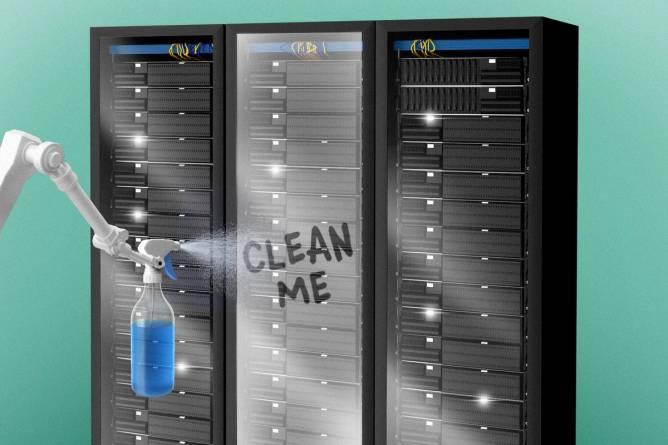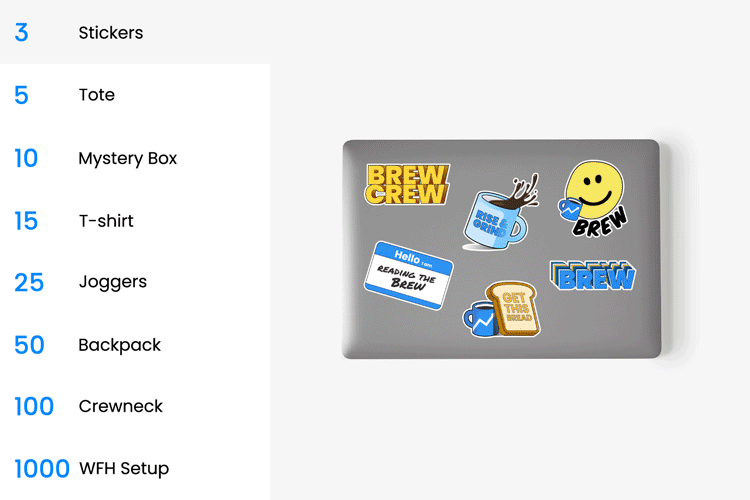Finally, Friday! And no one is probably as happy about that as Mark Zuckerberg, who needs a couple days after getting nothing—nothing!—from the crowd at his AI presentation this week.
In today’s edition:
🥚 Bigger than before
🛜 Free the ISP
 Crime doesn’t pay Crime doesn’t pay
—Eoin Higgins, Kelcee Griffis, Patrick Lucas Austin
|
|
Jirapong Manustrong/Getty Images
Cisco’s announcement on Sept. 21 that it intends to acquire software data-security company Splunk is a major development for the security industry, experts tell IT Brew, but not necessarily one that promises success.
The acquisition is likely to greatly expand Cisco’s data security capabilities; the company said in a press release that together, “Cisco and Splunk will become one of the world’s largest software companies.”
“There [have] been alternatives to Splunk but none that have really been able to compete at the same level that Splunk has,” Allie Mellen, a security analyst for Forrester, told IT Brew.
Cisco’s customers include organizations in the public and private spheres around the world, and the network administration company has been beefing up the software component of its business in recent years. Splunk’s strength lies in data observability and could give Cisco a leg up on the competition with respect to threat management and detection.
Troubled past. Despite the potential, Cisco’s history of acquisitions makes Mellen less than bullish on the new merger. In her view, the company hasn’t quite earned consumer trust. In the security industry, that’s of paramount importance.
“The acquisitions that Cisco has made in the past, particularly on the security side—for the most part, they just don’t live up to the expectation,” Mellen said.
Read more here.—EH
Do you work in IT or have information about your IT department you want to share? Email [email protected].
|
|
Everyone wants to finish the year strong. Here’s a powerful (and perhaps unexpected) tool to help you do it: SOC 2.
We see those raised eyebrows, but we’ve got proof: the new Thoropass compliance e-book. It includes the latest research and insights from compliance experts outlining how maintaining SOC 2 compliance can be a major business accelerator.
SOC 2 isn’t just a cybersecurity compliance framework. The guide highlights how it helps increase sales velocity, open new enterprise markets, and reduce internal resource constraints.
Plus, you’ll get the facts about SOC 2 time and cost expectations, multi-framework considerations, and maintaining your SOC 2 report.
Download the guide to learn how to leverage your SOC 2 report and unlock growth through compliance. And while you’re at it, book a demo with Thoropass and get a $100 gift card.
|
|
Jaczhou/Getty Images
Network throttlers and content blockers, beware! The controversial net neutrality rules favored by liberals could make a resurgence, thanks to a freshly instated Democratic majority at the Federal Communications Commission.
Under a proposal announced Tuesday, FCC Chair Jessica Rosenworcel recommended reviving the rules that “treat broadband internet service as an essential service for American life...on par with water, power, and phone service; that is: essential.” They would mandate that internet service providers may not interfere with how content is transmitted over the internet. This means that “fast lanes that favor those who can pay for access” would be prohibited, according to an agency fact sheet.
The proposal would also restore what’s known as Title II authority over the internet, effectively reextending the FCC’s domain over ISPs that was relinquished during the Trump administration.
A previous version of the rules took effect during the Obama administration, but Trump-era FCC Chairman Ajit Pai overturned them in 2017.
In remarks at the National Press Club, Rosenworcel said the rules are aimed at ensuring the internet is “fast, open, and fair for consumers everywhere.” They’ll also steer away from a “patchwork” of state regulations that have cropped up in the wake of Pai’s net neutrality repeal, according to the agency fact sheet, which pointed to California’s law enforcing open-internet principles in the state.
Read more here.—KG
Do you work in IT or have information about your IT department you want to share? Email [email protected].
|
|
Francis Scialabba
Target plans to invest in cybersecurity to prevent in-store retail theft, the company announced Sept. 26.
To protect stores against shrink, Target said it also plans to partner with the Department of Homeland Security.
The company intends to direct its cyber capabilities toward tracking “organized crime groups, tools, and services” as well as developing crime detection tools and tracking fraud through “data alerts and analysis.”
Retailers are increasingly looking to cybersecurity as a way to combat theft, combining it with physical measures. At the National Retail Federation’s (NRF) Protect conference in early June, Target VP of cybersecurity Jodie Kautt said the company is taking “mitigation or prevention steps to disrupt this activity right in line with the guest experience flow that the fraudsters are taking advantage of.”
Claims and allegations. Target will close nine stores in four states in late October, according to its statement, including locations in New York, Seattle, the Bay Area, and Portland, Oregon. Target made the “difficult decision” because “theft and organized retail crime are threatening the safety of our team and guests, and contributing to unsustainable business performance.”
Keep reading here.—EH
Do you work in IT or have information about your IT department you want to share? Email [email protected].
|
|
|
Make data resilience a breeze. Your data backup policy is pretty important, but it probably depends a little too much on the end user getting things right. CrashPlan’s new white paper shows you how to work with—not against—your employees. Make sure your data is backed up for good, for real. Secure your data.
|
|
Francis Scialabba
Today’s top IT reads.
Stat: 55%. That’s the proportion of companies that report spending more on cloud services this year than last in a new survey from Vertice. (CIO Dive)
Quote: “Who wouldn’t want Elon Musk sitting by their side running product?”—Linda Yaccarino, who became CEO of X in May, to a crowd at the Code Conference during a “car crash interview” on the company (Insider)
Read: As datacenter power needs grow, the industry is increasingly looking to atomic energy. (The Register)
Stalled → closed: Learn how SOC 2 can help you close deals before EOY in this Thoropass e-book. Might as well book a demo with Thoropass, too—you’ll get a $100 gift card when you do.*
*A message from our sponsor.
|
|
Are you an exec looking to make your next career move or join a board of directors? We’ve partnered with ExecThread, where you can find thousands of confidential job opportunities and board roles that aren’t listed anywhere else. Check out positions like:
|
|
|








